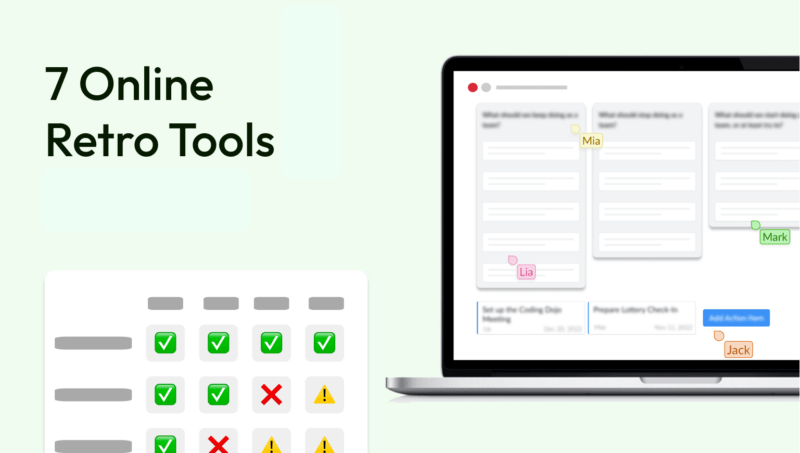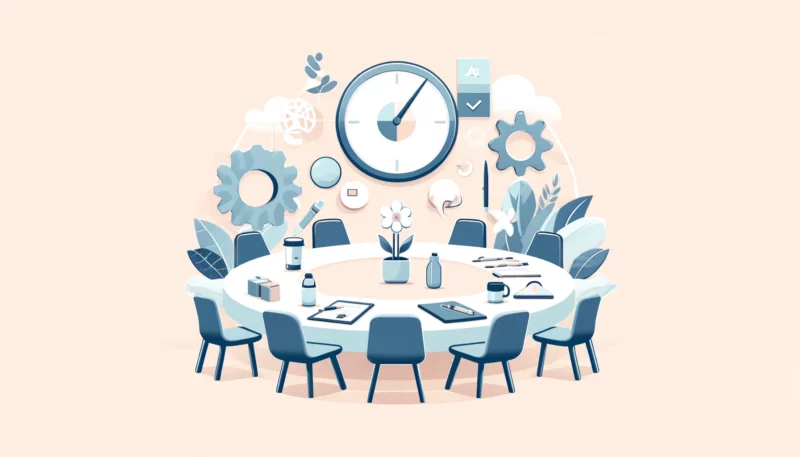To develop products faster, more and more companies are introducing agile ways of working. As part of this, they need to fill several key positions. Agile coaches play a crucial role in this process. They cultivate agile ways of thinking and acting within an organization – and thus unleash new productivity. The question many companies are facing: How many Agile Coaches do I need?
I will show you which tasks an Agile Coach takes on and which qualities he or he should have in order to be able to carry out his position efficiently. And: I'll explain to you how many Agile Coaches you need to gradually make your company agile on all levels.
What is an Agile Coach?
Agile Coaches create and optimize agile processes within a team or company. They can be used as employees or as external contractors. Their professional background is often in project management, product management, IT, or software development.
To embed Agile into the structures of an organization, Agile Coaches usually have a lot of experience with different Agile ways of working, such as the Scaled Agile Framework (SAFe), Scrum and Kanban. They are also skilled in coaching and mentoring. This means they can guide employees in a constructive and motivating way to find the right solutions to their challenges.
What does an Agile Coach do?
If you want a quick answer, Agile Coaches implement agile methodologies in the organization. I admit, that sounds very abstract. So, what do Agile Coaches do specifically in practice?
Create agile culture
Agile coaches create an agile culture in organizations. To do this, they not only integrate agile methods, but also create a work environment that gives employees psychological security and a sense of belonging. We show you what companies should look out for in our article "Agile Culture: These 10 ingredients you need for your organization".
Coach employees
Agile coaches introduce employees to the Agile way of thinking and acting. To do this, they teach them, for example, Systems Thinking and Servant Leadership , two elementary methods in the context of agile working.
Implement agile methods
Agile coaches integrate agile working gradually, often starting in the IT area, sometimes even throughout the entire company. Once implemented, they continuously evolve the processes. This helps organizations realize their business and customer value.
Deploy agile practices
Agile coaches not only teach the Agile way of working to teams, but also apply the tools and practices from Agile themselves. In this way, they address enterprise-wide bottlenecks.
Support agile ceremonies
Agile coaches support Agile ceremonies, such as retrospectives and big room planning. Teams thus manage their performance, prioritization, dependency management, and alignment with business strategy.
Why do I need an Agile Coach?
The Agile way of working is easy to understand. Therefore, many companies assume that they can use their own managers to implement Agile internally. In practice, however, things usually look different. Executives understand the way of thinking and acting of agile methods, but they do not know how to implement them in the structures of their organization.
A good example of this is Scrum. Scrum makes it (relatively) easy for companies to get started with the agile way of working. As a result, executives often believe that they have implemented all the right agile processes (keyword: Doing Agile vs. Being Agile). Nevertheless, they have the impression that these are not working as they should. Or in other words, that the changes are not bringing the success they envisioned.
This is where an Agile coach comes in. He or she can either take the reins from the beginning and gradually implement Agile in the company. Or he or she can act as a partner to the executives and teams, figuring out why Agile isn't delivering the expected results in certain places. And: what steps a department needs to take to change that.
The crucial role Agile coaches play in an Agile transformation was aptly summed up by the chief human resources officer of a telecommunications company:
"If you have really good agile coaches, you might have a chance." [of a successful agile transformation]
What makes a good agile coach?
We have now answered the question, "What do Agile Coaches do?" With that, we can move on to the next question: What makes a good Agile Coach? What are the requirements for an Agile Coach?
In our experience, Agile Coaches need four basic skills or characteristics to be successful. Agile Coaches...
1. Know Agile
Let's start with the obvious: Agile coaches master the agile way of working at all levels. To do this, they understand how to embed the mindsets and practices into the structures of an organization. In doing so, they know, for example, when Kanban and Scrum are the right choice for an organization and when it would be better to focus on Lean.
To fall on open ears everywhere during their work, it is also helpful if they are familiar not only with the basics of software development, but also with those of analytics and design. This makes it easier for them to find the right words and actions to implement Agile in all departments.
2. Are selfless
Agile coaches are always actively listening to employees and putting themselves in their shoes. In this way, they empower them to improve their performance. Agile coaches therefore take on a selfless role. Because they stand in the background while teams take credit for success.
3. Empower others
Another important requirement for an Agile Coach: He or she manages to make teams recognize mistakes themselves, learn from them, find solutions themselves and implement them. In other words, Agile Coaches empower employees and teams to help themselves. This sounds simple in theory but is difficult in practice. Because this approach requires a departure from the classic corporate DNA. This dictates: Find the problem and solve it. Agile coaches are therefore not the solvers themselves but must convey this DNA to employees.
4. Think revenue-focused
In addition to human and professional qualities, Agile Coaches should also have a revenue-focused mindset. Only when they take into account the financial and operational realities of a business they can implement agile methods in a way that teams actually improve their performance – and thus increase revenue. In short, agile coaches know what the financial goal is in the background of their actions. It may be higher productivity, faster time to market, higher customer satisfaction, or better product quality. All of these ultimately lead to more revenue.
McKinsey also comes up with four essential qualities that a good Agile Coach should have:
Source: Growing your own agility coaches to adopt new ways of working | McKinsey
How many Agile Coaches do I need?
This brings us to the final question: How many Agile Coaches do I need to implement the agile way of working efficiently and successfully?
First of all: This depends on whether and how many Scrum Master you have in your company. Scrum Masters coordinate product development according to the so-called Scrum Framework. In doing so, they coach team members in such a way that they can utilize their competencies in the project. And they make sure that teams stick to the Scrum framework in their work.
As you can quickly see here: The area of responsibility of a Scrum Master overlaps with that of an Agile Coach. This means for practice: To answer how many Agile Coaches you need, we have to divide into two scenarios:
1. You have Scrum Masters
If your organization uses Scrum Masters, you can remember as a rule of thumb: According to our practical experience, one Agile Coach supervises 3-5 teams. The exact number depends on the type and maturity of the teams and the maturity of the Agile Coach.
2. You don't have Scrum Masters
If your organization does not employ Scrum Masters, the number of Agile Coaches required depends on your approach to Agile. There are 3 possible scenarios:
a) You want to go full throttle with the Agile transformation and therefore establish retrospectives and Kanban, for example, at all levels of your organization. Usually, you need one Agile Coach for 2 teams. It is also possible that one coach takes over 3 teams or more. However, our experience has shown that the quality of the coaching then decreases.
b) Your budget for the agile transformation is limited. Then you hire some Agile coaches who do not coach specific teams but give pull-based workshops. That means: If a team has problems, it requests an Agile Coach. The coach then supports the team over a fixed period of time. During this time, he or she conducts retrospectives with the employees, for example. He checks how agile methods can help the team's challenges.
c) You hire 1-3 Agile Coaches and assign them to selected areas or departments. They implement the Agile way of thinking and acting there. Employees who have internalized Agile and are interested in the way of working can then be used as Agile coaches. They do not have the high qualities of a trained Agile Coach. However, they can support the "real" Agile Coaches in their work – and thus further advance the Agile transformation.
How many Agile Coaches do I need? – Conclusion
Agile transformation is hardly possible without Agile Coaches. They manage to anchor agile thinking and behavior at all levels of an organization. However, not every company has the necessary budget for Agile Coaches.
Our Echometer tool can help you. With it you can conduct retrospectives that sustainably and measurably develop your organization. Because retrospectives are the most important agile event. Not only can you use them to concretely evaluate the work you have done, but you can also gradually shape the mindset and culture in your organization in an agile way.
Our eBook for retrospectives, which is free of charge, shows you to what you should pay attention to. In it, we give you 20+ facilitation tips to help you learn how to establish an efficient change process through retrospectives.








